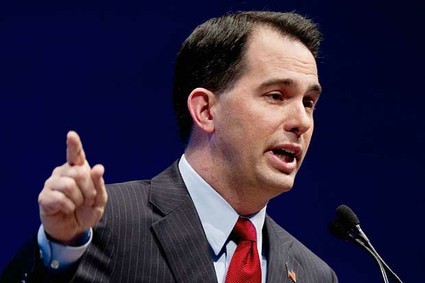In the aftermath of the 2012 elections, Republicans took solace in the idea that while the GOP isn’t doing well in Washington, it’s winning in emphatic fashion elsewhere. Republicans have historic levels of dominance in governorships and state legislatures, and that’s led a number of conservatives to pronounce the states as where the right’s focus ought to be for the next several years, as Washington finds itself in constant gridlock.
Yet the failures of Republican governance aren’t limited to Washington – they can make mistakes in the states, too. Consider as a guide the past week of decisions which represented a contrast in styles from three self-styled conservative governors with starkly different paths, styles, and states: Virginia’s Bob McDonnell, Florida’s Rick Scott, and Wisconsin’s Scott Walker.
Of this trio, Walker is the Good. Facing the challenge of governing a blue state and with perhaps the nation’s most fractious political scene, Walker in the past week rejected Obamacare’s Medicaid expansion and proposed a permanent rate cut in the state income tax, targeted at the middle class. His budget would cut state income taxes, allow no general sales tax increases, and holds down increases on property tax bills to no more than 1 percent a year for median value homes.
Walker called for dramatically expanding the school voucher program in the state as well, for any sizable district which has two schools receiving D or F grades. And despite a state commission recommending hiking gas taxes and fees to pay for transportation costs, instead Walker said he would sell or lease state properties and power plants to make up the difference.
The Bad is Rick Scott. The Florida governor went back on his word in the biggest way possible this week, announcing he would implement the same Medicaid expansion under Obamacare that his state sued to prevent. Scott’s entire career is arguably due to his opposition to Obamacare, and his argument that he was able to extract some concessions from the Obama administration along the way doesn’t fly with health policy experts. It turns out Kansas, which isn’t expanding Medicaid, is getting the same waiver Scott is for his system without the quid pro quo.
Scott’s depressing approach is an act of governance by desperation – a politician scared by the threat of Charlie Crist. You should never do things because you are afraid of Charlie Crist. The day you do that, you should probably quit politics.
And that brings us to Virginia’s Bob McDonnell. Telegenic as he is, he is The Ugly. His determination to have a legislative legacy led him to ram through a $6 billion tax increase on the people of the Old Dominion (a tax increase nearly six times the size of his original proposal) for the sake of building more roads. Remember when Virginia Republicans ran whole campaigns on eliminating the car tax? McDonnell just boosted it, and the sales tax, and a slew of other taxes, too.
McDonnell was so desperate to ditch his anti-tax pledge and get this tax hike passed through the legislature – he did so with a higher percentage of Democrat votes than Republican – that he even went back on his word to oppose Obamacare’s Medicaid expansion, endorsing a Democrat-favored commission to advance the costly expansion. That’s right: McDonnell was so set on raising taxes, he caved on Obamacare implementation, too. Which will lead to more taxes in the future, too.
Of the three of these men, Walker arguably had the least experience before reaching the governorship. He doesn’t have a college degree, a telegenic mane, or a presidential resume. But the primary difference between these three men is that one approached his decision thinking about re-election, one approached it thinking about efficient management, and one approached the decision process focused on sparking dramatic policy reform. Just thinking about re-election is old style politics. And benign management was fine in the days when leviathan wasn’t a reality. But what’s needed now is someone who can take a far more aggressive reform-minded approach, recognizing that political capital is useless if left unspent.
What’s needed is fewer candidates who care about being viewed as pragmatic by the liberal press or care about consultant advice about the next election, and more who care about what’s right, who will stand on conservative principles and reject increases in the size of government and the size of the tax burden. After all, if a pragmatic conservative’s role is to raise taxes and expand entitlements, what’s the difference between them and a pragmatic liberal?
[First published at Real Clear Politics.]





